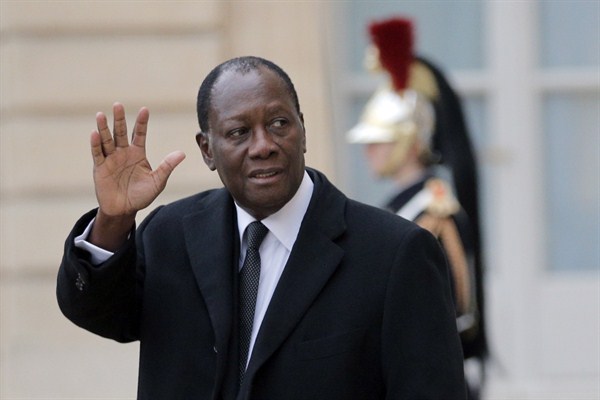A presidential election on Oct. 25 is likely to bring a second term for Cote d’Ivoire’s president, Alassane Ouattara. The economy is booming, with growth rates consistently above 8 percent, and in a region scarred by crises—from the ravages of Ebola to Islamic extremism in the Maghreb and around Lake Chad—Cote d’Ivoire stands out as an attractive proposition for investors. Abidjan has bounced back from the dark days of post-election violence in 2010 and 2011, with life returning even to the poor neighborhoods that saw the worst of the fighting. Ouattara, a smooth, bilingual technocrat, has maintained good external relations. The future seems bright.
It also seems a resounding vindication for Ouattara’s allies, chief among them France, which intervened decisively against former President Laurent Gbagbo, the loser in 2010. The precise role played by external forces in the fighting, particularly the destruction of Gbagbo’s fortified residence in April 2011, will probably never be known, but is likely to have been pivotal in securing Ouattara’s triumph. Gbagbo is now in The Hague, standing trial at the International Criminal Court alongside his key lieutenant, Charles Ble Goude. Earlier this year, a court in Cote d’Ivoire sentenced Gbagbo’s wife, Simone, to 20 years in prison for her role in the crisis. As victories go, this one seems crushingly complete.
Of course, winners get to write the histories. The dominant narrative of the 2010-2011 crisis casts Gbagbo as an aging demagogue, clinging to power through the deployment of increasingly rabid ethno-nationalism, finally unseated by a principled coalition acting in defense of a democratically elected president. West Africa stood firm against Gbagbo, and international allies put their money—and troops—where their mouth was to support Ouattara. It is not by any means a wholly inaccurate view. Security has largely returned across the country. And the headline Ivorian economy has bounced back strongly, with Ouattara’s international allies following up their military support with substantial debt relief and external investors pouring in.

